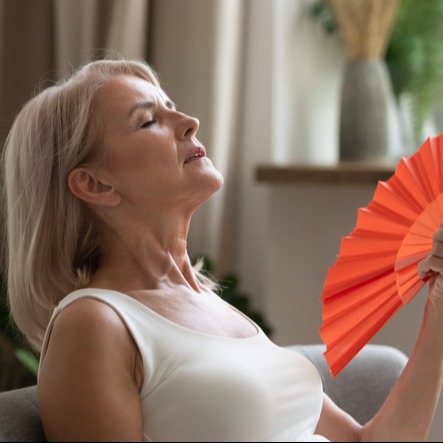
Following a partial hysterectomy, many women experience a range of symptoms indicative of menopause. These include not only well-documented issues like hot flashes and night sweats but also less frequently discussed effects, such as psychological fluctuations and changes in libido. The complexity of these symptoms and their impact on daily life highlight the need for a deeper understanding of their biological underpinnings and the effectiveness of various treatment options. Managing these changes effectively requires considering both medical interventions and lifestyle adjustments. Engaging in this discussion can provide valuable insights for navigating this challenging transition with greater ease and comfort.
Key Takeaways
Hot flashes and night sweats often occur due to decreased hormone levels.
Irregular periods or the cessation of menstruation may indicate a hormonal imbalance.
Mood swings and heightened anxiety are common emotional symptoms.
Sleep disturbances, including difficulty falling asleep and night sweats, are prevalent.
Weight gain can occur as hormonal changes affect metabolism.
Identifying Menopausal Symptoms
Understanding the range of menopausal symptoms following a partial hysterectomy is essential for timely and effective management. This procedure, involving the removal of part of the uterus, can significantly alter a woman’s hormonal balance, leading to various physical and emotional challenges. The onset of menopausal symptoms may occur earlier than expected due to hormonal changes triggered by the surgery. Women may experience symptoms such as irregular periods and night sweats, which signal hormonal imbalance.
Weight gain is another common issue post-hysterectomy, often linked to hormonal shifts that affect metabolism and fat distribution. Monitoring symptoms closely can help identify these changes early, enabling prompt intervention. Symptoms to watch for include not only the well-known hot flashes and vaginal dryness but also less obvious signs such as fatigue, memory lapses, and mood fluctuations.
Healthcare providers play a critical role in recognizing early menopausal symptoms. Prompt identification allows them to implement effective strategies to manage hormonal imbalances and mitigate their impact on a woman’s quality of life.
Hormonal Changes Explained
After a partial hysterectomy, a woman’s hormonal landscape undergoes significant changes, often resulting in various menopausal symptoms. While the ovaries remain intact, the removal of part of the reproductive system can still impact hormone levels, leading to a hormonal imbalance typically associated with menopause.
To better understand these changes, consider the following points:
Disruption of Hormone Levels: Although the ovaries are preserved, the removal of the uterus can reduce the production of key hormones like estrogen and progesterone, which are essential for regulating numerous bodily functions.
Symptoms of Hormonal Imbalance: Women may experience symptoms such as hot flashes, mood swings, and vaginal dryness. These symptoms reflect the hormonal shifts occurring in the body.
Hormone Replacement Therapy (HRT): To manage these symptoms and restore hormonal balance, healthcare providers may recommend hormone replacement therapy. HRT can stabilize fluctuating hormone levels and alleviate the discomfort caused by these changes.
Understanding these hormonal changes after a partial hysterectomy is essential for effectively managing symptoms and maintaining overall health.
Managing Sleep Disturbances
Sleep disturbances following a partial hysterectomy, including insomnia and nighttime awakenings, can be aggravated by hormonal changes and menopausal symptoms such as hot flashes. These disruptions are often further intensified by night sweats, another common postoperative symptom, and can significantly impact daily functioning and overall quality of life.
To manage these sleep issues effectively, addressing both physical and environmental factors is crucial. Creating a cool and comfortable sleeping environment can help alleviate discomfort caused by hot flashes and night sweats. Strategies may include using breathable bedding materials, maintaining a lower room temperature, and utilizing fans or air conditioning, particularly during warmer months.
Managing stress also plays a vital role in combating sleep disturbances. Practices such as mindfulness meditation, deep breathing exercises, and gentle yoga before bedtime can promote relaxation and support more restful sleep. Establishing a consistent bedtime routine, such as reading or listening to soothing music, can further signal to the body that it is time to wind down.
Consulting with a healthcare provider is advisable to explore treatment options like hormone replacement therapy, which can help balance hormonal changes and address the underlying causes of these sleep issues.
Addressing Emotional Well-being
Emotional well-being can be significantly affected by hormonal fluctuations and the psychological impact of undergoing a partial hysterectomy. As women navigate this transition, changes in hormone levels may lead to a range of emotional symptoms, including mood swings and anxiety. These symptoms not only influence mental health but can also disrupt daily life, underscoring the importance of effective support and management strategies.
Here are key approaches to enhance emotional well-being during this phase:
Seek Professional Support: Engaging with healthcare providers experienced in post-hysterectomy care is essential. They can offer tailored guidance, treatment options, and referrals to mental health specialists when needed.
Connect with Support Groups: Joining groups where individuals share similar experiences can provide comfort and valuable insights. Peer support helps normalize feelings and offers practical coping strategies.
Practice Mindfulness and Self-Care: Regularly participating in activities that promote relaxation and mental clarity—such as yoga, meditation, or simple breathing exercises—can help alleviate anxiety and improve overall emotional health.
Hormone Replacement Therapy Options
Building on the importance of emotional support, exploring hormone replacement therapy (HRT) offers another crucial approach to managing menopausal symptoms following a partial hysterectomy. HRT can play a significant role in restoring hormonal balance, alleviating discomforts such as hot flashes, vaginal dryness, and sleep disturbances.
Treatment typically involves estrogen replacement, which can be administered in various forms, including pills, patches, rings, or creams. This therapy is designed to supplement the body's reduced estrogen levels, which often decline after the removal of the upper part of the uterus during a partial hysterectomy. Stabilizing these levels can help reduce menopausal symptoms and improve overall well-being.
However, it is essential to discuss HRT options with a healthcare provider. Each woman's body responds differently to hormone therapy, and factors such as personal health history and risk factors must be considered. Potential risks of HRT, including an increased likelihood of stroke and blood clots, need to be carefully weighed against the benefits.
To ensure safety and optimize outcomes, regular monitoring of hormone levels is vital. Through collaboration with their healthcare providers, women can navigate HRT options effectively, managing symptoms and enhancing their quality of life post-surgery.
Frequently Asked Questions
How to Tell if You Are in Menopause After Partial Hysterectomy?
To determine if you are in menopause after a partial hysterectomy, monitor symptoms like hot flashes, sleep disturbances, and vaginal dryness. Consulting with a healthcare provider for hormonal assessments is also recommended.
What Is the Average Age for Menopause After a Partial Hysterectomy?
Amid the complexities of women’s health, a compelling question arises: When does menopause typically occur following a partial hysterectomy? Research suggests that the average age is around 48–49 years, which may be earlier than the natural onset of menopause.
What Is Menopause Like Without a Uterus?
Menopause without a uterus typically eliminates menstrual changes but does not prevent other symptoms such as hot flashes, mood fluctuations, and vaginal dryness, which are caused by decreased hormone levels.
What Happens to Your Hormones After a Partial Hysterectomy?
Following a partial hysterectomy, the body undergoes a hormonal adjustment as estrogen and progesterone levels shift. This can result in symptoms commonly associated with menopause, even when the ovaries are retained.
Rely on PlanetDrugsDirect.com to Buy Prescription Discount Drugs Online
As a trusted prescription referral service, we offer important benefits whenever you order online. Each of our partner pharmacies and/or government-approved dispensaries is committed to providing the best experience possible of any online prescription referral service on the internet. We offer:
Low prices
Quick turn-around times
Generic and brand-name medications
Unparalleled customer service
Sources
Farquhar CM, Sadler L, Harvey SA, Stewart AW. The association of hysterectomy and menopause: a prospective cohort study. BJOG. 2005 Jul;112(7):956-62. doi: 10.1111/j.1471-0528.2005.00696.x.
Thompson JD, Birch HW. Indications of hysterectomy. Clin Obstet Gynecol. 1981 Dec;24(4):1245-58. doi: 10.1097/00003081-198112000-00020.
Xu Z, Chung HF, Dobson AJ, Wilson LF, Hickey M, Mishra GD. Menopause, hysterectomy, menopausal hormone therapy and cause-specific mortality: cohort study of UK Biobank participants. Hum Reprod. 2022 Aug 25;37(9):2175-2185. doi: 10.1093/humrep/deac137.
Huang Y, Wu M, Wu C, Zhu Q, Wu T, Zhu X, Wu M, Wang S. Effect of hysterectomy on ovarian function: a systematic review and meta-analysis. J Ovarian Res. 2023 Feb 9;16(1):35. doi: 10.1186/s13048-023-01117-1.
Haney AF, Wild RA. Options for hormone therapy in women who have had a hysterectomy. Menopause. 2007 May-Jun;14(3 Pt 2):592-7; quiz 598-9. doi: 10.1097/gme.0b013e31804154d5.
 Medically reviewed by
Medically reviewed by 





